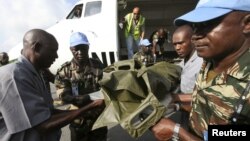Liberia’s foreign minister has pledged his country will not “allow any inch” of its territory “to be used to destabilize any one of our neighbors,” after gunmen allegedly crossed into neighboring Ivory Coast and killed seven UN peacekeepers and eight civilians.
Foreign Minister Augustin Ngafuan said it is unclear who committed the attack in the Ivorian border town of Tai, but he said Monrovia is taking the situation seriously.
“Whether they came out of Liberia, or whether they are based in Cote d’Ivoire, doesn’t matter so much. What matters is that there was an incident in Cote d’Ivoire that concerns everybody.”
Ngafuan said the government has taken several measures to ensure there are no possible incursions into Ivory Coast from anyone based in Liberia.
“The decisions reached include the following: first, the immediate closure of the border on the Liberian side, with the exception of humanitarian movement of the UN; second, the immediate deployment of members of the armed forces of Liberia and armed reinforcements of the Liberian national police and immigration to the border.”
Liberia has also suspended mining activity in the region and said it is considering moving refugee camps near the border to locations deeper within its territory.
Ngafuan said the most important thing is to maintain the progress and peace that has emerged in the region after civil wars in Sierra Leone, Ivory Coast, and Liberia.
“Liberia had a difficult decade or so and we do not want a reversal of the gains we’ve scored within the sub-region. So, we do not look at whatever happens in Cote d’Ivoire to be an Ivorian problem, it is a collective problem of the sub-region.”
Human Rights Watch released a report last week accusing Liberia of failing to stop mercenaries from running deadly cross-border raids into Ivory Coast and recruiting child soldiers. The international rights group said the attackers include Liberian mercenaries and Ivorian militiamen who fought for Ivory Coast's former president Laurent Gbagbo.
Ngafuan rejected the criticism, saying Liberia has been working closely with its neighbors on this issue. For instance, he said last month, after a meeting in Ivory Coast, Liberia agreed to extradite any mercenaries it had arrested.
“We have been taking actions,” Ngafuan said, “and these new measures,” including closing the border, “are just continuations of the acts we have already taken.”
Former Ivorian President Laurent Gbagbo lost a 2010 presidential poll to his successor, Alassane Ouattara, but fought to remain in power. About 3,000 people were killed in a bloody power struggle between the two sides, until the former president was captured in April of last year. He has been charged with crimes against humanity and is being held in The Hague by the International Criminal Court.
Foreign Minister Augustin Ngafuan said it is unclear who committed the attack in the Ivorian border town of Tai, but he said Monrovia is taking the situation seriously.
“Whether they came out of Liberia, or whether they are based in Cote d’Ivoire, doesn’t matter so much. What matters is that there was an incident in Cote d’Ivoire that concerns everybody.”
Ngafuan said the government has taken several measures to ensure there are no possible incursions into Ivory Coast from anyone based in Liberia.
“The decisions reached include the following: first, the immediate closure of the border on the Liberian side, with the exception of humanitarian movement of the UN; second, the immediate deployment of members of the armed forces of Liberia and armed reinforcements of the Liberian national police and immigration to the border.”
Liberia has also suspended mining activity in the region and said it is considering moving refugee camps near the border to locations deeper within its territory.
Ngafuan said the most important thing is to maintain the progress and peace that has emerged in the region after civil wars in Sierra Leone, Ivory Coast, and Liberia.
“Liberia had a difficult decade or so and we do not want a reversal of the gains we’ve scored within the sub-region. So, we do not look at whatever happens in Cote d’Ivoire to be an Ivorian problem, it is a collective problem of the sub-region.”
Human Rights Watch released a report last week accusing Liberia of failing to stop mercenaries from running deadly cross-border raids into Ivory Coast and recruiting child soldiers. The international rights group said the attackers include Liberian mercenaries and Ivorian militiamen who fought for Ivory Coast's former president Laurent Gbagbo.
Ngafuan rejected the criticism, saying Liberia has been working closely with its neighbors on this issue. For instance, he said last month, after a meeting in Ivory Coast, Liberia agreed to extradite any mercenaries it had arrested.
“We have been taking actions,” Ngafuan said, “and these new measures,” including closing the border, “are just continuations of the acts we have already taken.”
Former Ivorian President Laurent Gbagbo lost a 2010 presidential poll to his successor, Alassane Ouattara, but fought to remain in power. About 3,000 people were killed in a bloody power struggle between the two sides, until the former president was captured in April of last year. He has been charged with crimes against humanity and is being held in The Hague by the International Criminal Court.






